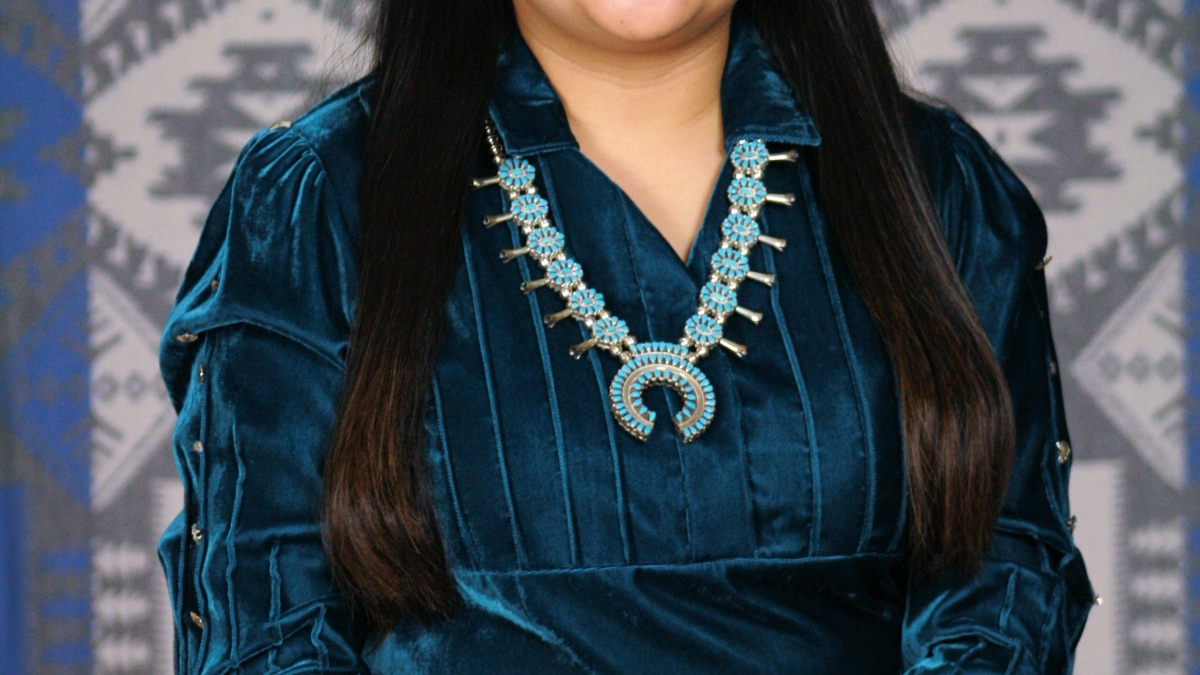Master of Social Work grad draws from history and legacy to help others

Jennifer Harrison.
Editor’s note: This is part of a series of profiles for spring 2019 commencement.
Jennifer Harrison’s master’s degree in social work bears proof she has the training and knowledge to be an effective professional. But the summa cum laude graduate of Arizona State University will put so much more than that into her career of helping people.
In service to American Indian communities and in staying true to herself, Harrison, of Gallup, New Mexico, will draw from history and legacy in pressing forward in a career in social work. Restoring a strong foundation of tradition and the ceremonies taught by elders “that guide us in our life journeys,” she said, is important in addressing the historical trauma found at the root of modern-day suffering among some American Indians.
Harrison, a first-generation college graduate, is the spring 2019 outstanding graduate for the School of Social Work in Watts College of Public Service and Community Solutions.
Scholarship and leadership are hallmarks of Harrison’s career at ASU, where she also received her bachelor’s degree. She earned her master’s degree through scholarships from the Navajo Nation and the National Child Welfare Workforce Institute. She is the president of the American Indian Social Work Student Association and has been active in ASU campus conversations about diversity and inclusion.
Christopher Sharp, a project coordinator in the School of Social Work’s Office of American Indian Projects, said he has enjoyed watching Harrison apply skills that have made an impact at the university and in the community.
“She is self-confident and can advocate, but in a humble way,” Sharp said, adding that she exceeds expectations in leadership. He believes that will continue as she pursues her passion of tribal child welfare and becomes a leader in that field. “She’ll be an asset to the community that she works with."
Last fall, she coordinated a powerful signature event for Native American Heritage Month featuring a pre-release screening of “Blood Memory” and a discussion with Sandy White Hawk, one of the main subjects in the documentary about the U.S. Indian Adoption Era. The “Blood Memory” event was designed to raise awareness about the Indian Child Welfare Act of 1978, which is under legal challenge. Harrison is a strong advocate of that act, often referred to as the “gold standard” in child welfare policy.
The Indian Child Welfare Act was a response to an alarmingly high rate of forced removal of American Indian children from their traditional homes. Those child removal and adoption practices, like the U.S. policy of forcibly removing children from their homes and into government-run boarding schools, was considered another in a series of attempts to eradicate American Indian culture and customs.
Harrison, the mother of a young son, knows the value of culture and customs. She believes values handed down by her elders helped her overcome challenges and obstacles to her success, including the oppressive grief of losing a parent and grandparent and the culture shock of moving from a small town to a big city far from family.
Those same values are helping Harrison raise her son and to be a community leader where needed. When she moved to Phoenix three years ago, she had no idea leadership and volunteer roles with Cub Scouts and youth sports would be such a big part of her life.
Harrison came to be a social worker by way of studying nursing and then nearly becoming a physical therapist.
“My family is like, ‘Stick to one thing.’ But no, 'I want to do this, and this and this,'” Harrison said.
Everything she wanted to do was in what someone called a “helping profession.” A helper is who Harrison is at her core.
“I found out about social work and saw that’s exactly what I want to do, not the medical aspect but the advocacy aspect of it,” Harrison said.
Harrison got a taste of advocacy work by volunteering with the Court Appointed Special Assistant program. While she intends to concentrate on Indian Child Welfare Act advocacy, she does entertain future plans of earning a doctoral degree in social work or perhaps becoming a guardian ad litem — a guardian appointed by a court to protect the interests of a minor or other vulnerable individual — which could put her on a path to attend law school.
There is no shortage of areas to help, Harrison realizes, but there is success with commitment. She encourages those still in school to stay focused and dig deep.
“It’s possible to reach your dream,” Harrison said. “Don’t give up on it. It’s not easy, but it’s possible.”
Story by Jennifer Dokes
More Sun Devil community

Supporters show their generosity during Sun Devil Giving Day 2025
Thousands of Arizona State University supporters from across the globe came together on Sun Devil Giving Day on March 20 to give…

New ASU women's basketball coach has sights set on championships
Molly Miller apologized for being a few minutes late for her Zoom interview Sunday afternoon.No apology was necessary.It’s been a…
SolarSPELL wins 'best in show' award at South by Southwest
Arizona State University professors from a variety of disciplines made a big splash at the South by Southwest festival of…

